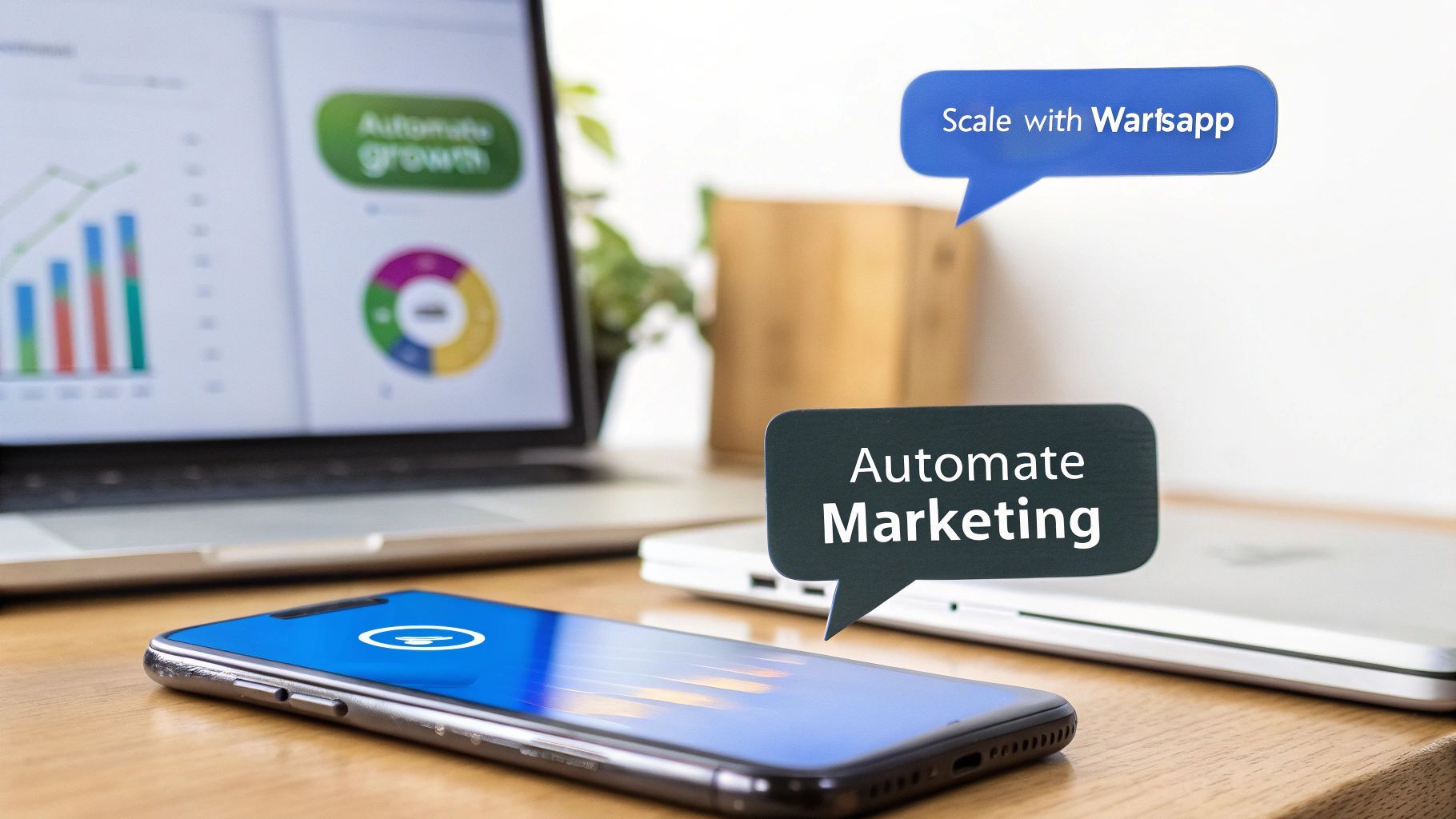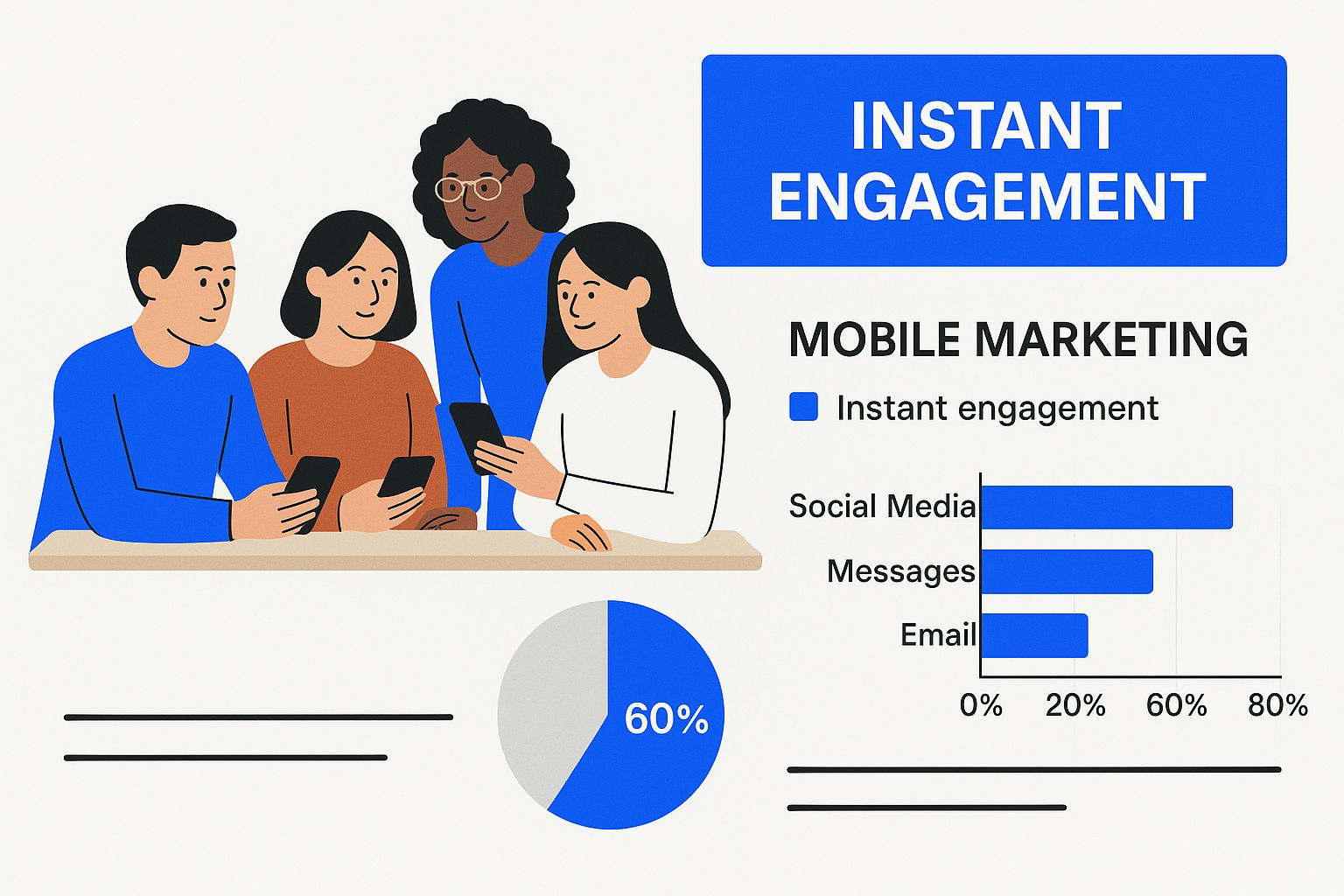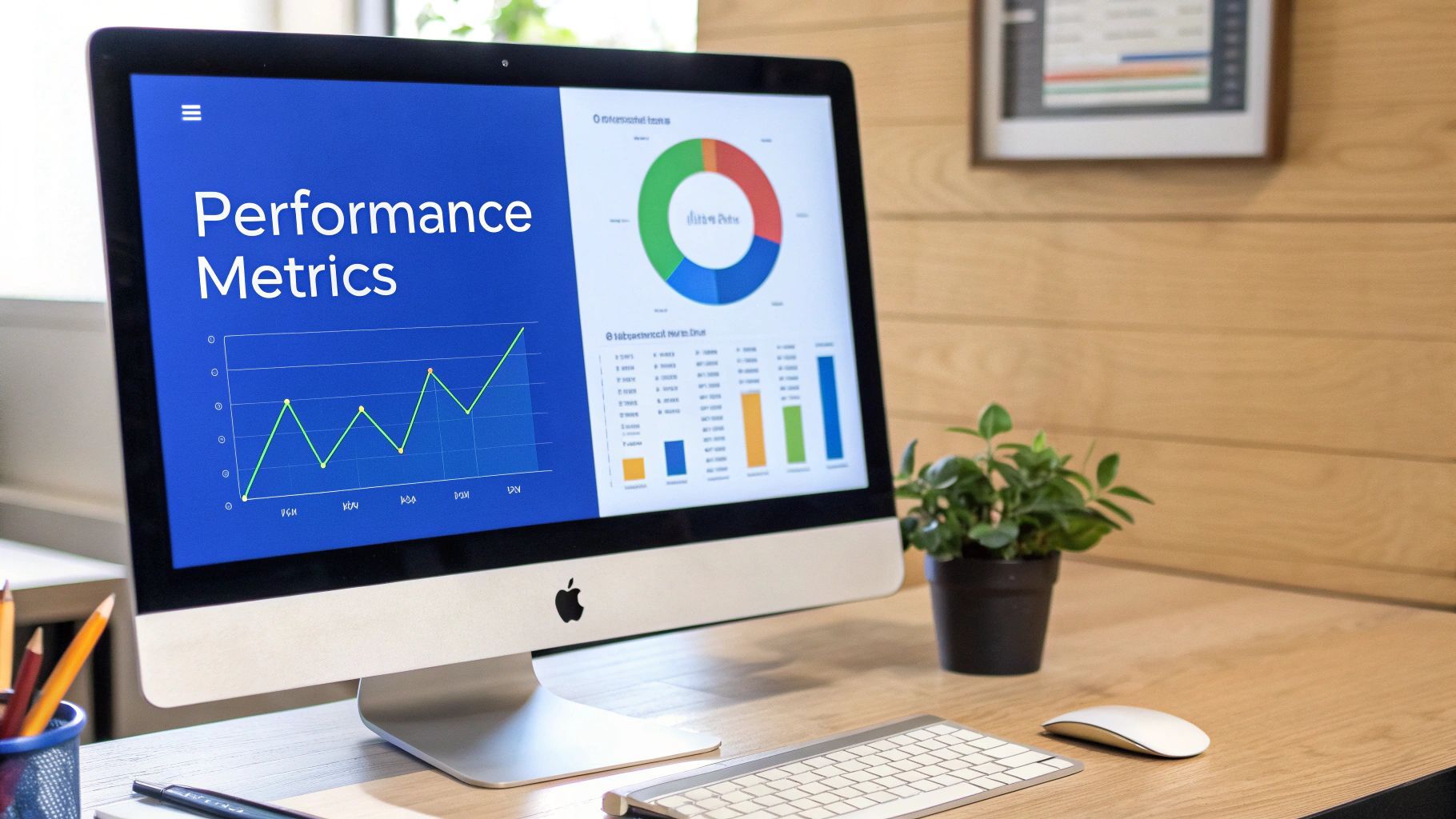
WhatsApp Marketing Automation: Scale Your Business Growth
Discuss with AI
Get instant insights and ask questions about this topic with AI assistants.
💡 Pro tip: All options include context about this blog post. Feel free to modify the prompt to ask more specific questions!
WhatsApp marketing automation is more than just sending bulk messages. It's about crafting personalized, engaging experiences that foster strong customer relationships and ultimately drive conversions. Imagine having a team of virtual assistants working around the clock, answering customer questions, providing support, and guiding them through the sales funnel – all without constant human oversight. This frees up your team to focus on strategic initiatives, while ensuring your customers receive timely and relevant communication. This section explores the core principles of this powerful marketing strategy.
WhatsApp marketing automation utilizes software to automate various aspects of your WhatsApp communications. This includes everything from sending welcome messages to new subscribers, to delivering targeted promotional offers based on customer behavior. Imagine a clothing retailer automatically sending messages showcasing new arrivals to customers who have previously purchased similar items. This targeted approach ensures customers receive information relevant to their interests, boosting engagement and the likelihood of a purchase.
Several key components contribute to a successful WhatsApp marketing automation strategy:
- Chatbots: These automated programs handle a wide range of customer interactions, from answering FAQs to providing order updates and even qualifying leads. Chatbots can significantly improve customer service efficiency.
- Automated Message Sequences: These pre-defined message series are triggered by specific events, like subscribing to a list or making a purchase. They allow you to nurture leads, onboard new customers, and deliver personalized content over time.
- Broadcast Lists: These lists enable you to send bulk messages to a large audience, ideal for announcing promotions, sharing important updates, or promoting new products. However, use broadcast lists strategically to avoid being perceived as spam.
- Integrations: Integrating your WhatsApp marketing automation platform with your CRM and other marketing tools allows for seamless data flow and personalized experiences. This integration lets you leverage customer data to create highly targeted campaigns and track the effectiveness of your automation efforts.
WhatsApp is widely recognized as a highly effective platform for marketing automation, empowering businesses of all sizes to connect with their customers. As of 2025, WhatsApp boasts over 2.78 billion unique users globally, a figure projected to exceed 3.14 billion by the end of the year. This extensive user base makes WhatsApp a critical channel for businesses seeking to scale, with 84% of small and medium businesses viewing WhatsApp chatbot tools as essential for growth. For more in-depth statistics, visit: Learn more about WhatsApp statistics. After implementing your WhatsApp automation strategy, measuring its success is crucial. Learn more about how to measure the success. This understanding helps refine your approach and maximize your return on investment. Mastering WhatsApp marketing automation is clearly essential for businesses striving to thrive in today's competitive market.
WhatsApp marketing automation has rapidly become essential for businesses looking to connect with customers on a deeper level and boost sales. But what makes it so much more effective than traditional channels like email and SMS? It's a combination of factors, from the inherent trust users have in the platform to how they use it every single day.
Take a look at your own email inbox. How many unread promotional emails are staring back at you? Probably a lot. Email, while still useful, often gets buried. SMS messages face a similar problem, frequently seen as impersonal marketing spam. WhatsApp, on the other hand, feels more personal. It's where we connect with friends and family, creating a sense of trust that's hard to achieve elsewhere. This trust translates into significantly better open and click-through rates for businesses using WhatsApp marketing automation.

The infographic above shows a modern marketing team using smartphones and WhatsApp to engage with customers instantly. The image highlights how WhatsApp allows for real-time interaction, which leads to more engagement. It emphasizes the shift towards mobile-first communication and how platforms like WhatsApp are leading the charge.
WhatsApp's real-time nature is another big reason why it's so effective. While emails can sit unopened for days, WhatsApp messages are usually seen and responded to within minutes. This lets businesses have more dynamic conversations, answer customer questions quickly, and build stronger relationships. WhatsApp marketing automation truly shines in its ability to drive engagement and conversions, outpacing traditional channels. Studies show WhatsApp messages have a 98% open rate, compared to just 21% for emails and SMS. Furthermore, WhatsApp conversion rates range from 45% to 60%, significantly higher than the typical 2-5% seen with email and SMS. Find more detailed statistics here.
To illustrate the performance differences, let's examine a comparison table:
To better visualize these performance differences, let's examine a comparison table:
WhatsApp vs Traditional Marketing Channels Performance Comparison
A detailed comparison showing open rates, conversion rates, and engagement metrics across different marketing channels.
Marketing Channel Open Rate Conversion Rate Engagement Level Cost Effectiveness WhatsApp ~98% 45-60% Very High High Email ~21% 2-5% Medium Medium SMS ~21% 2-5% Low Medium
This table clearly demonstrates WhatsApp's superior performance across all metrics. The high open and conversion rates, combined with superior engagement, highlight its efficacy. While email and SMS still have their place, WhatsApp offers a more engaging and cost-effective way to reach customers.
Email and SMS mainly rely on one-way communication. You send a message and hope for a reply. WhatsApp, however, encourages two-way conversations. It's built for dialogue, which makes it easier for businesses to connect with customers in a personalized way. Imagine using WhatsApp automation to send a personalized product recommendation based on a customer's previous purchases. This personalized approach can spark a conversation, providing valuable feedback and increasing engagement.
The impressive engagement and conversion rates of WhatsApp marketing automation translate directly into a better return on investment (ROI). As businesses experience the impact of WhatsApp, they're moving their marketing budgets away from traditional channels and focusing on this more effective platform. This strategic shift lets companies reach a wider, more engaged audience, which ultimately leads to more sales and stronger customer relationships. Businesses are seeing significant ROI improvements by prioritizing WhatsApp automation, showcasing its strength in driving impactful results.
Selecting the right WhatsApp automation platform is crucial for maximizing your marketing ROI. With many options available, carefully evaluating each platform's features, pricing, and suitability for your business is essential. This section will guide you through the key considerations to help you make an informed decision.
Not all WhatsApp automation platforms are created equal. Focus on these essential features during your evaluation:
- WhatsApp Business API Integration: Ensure the platform integrates seamlessly with the official WhatsApp Business API. This is crucial for sending bulk messages and using advanced automation.
- CRM Integration: Integrating your CRM is vital for personalized messaging. This integration allows the platform to access valuable customer data, enabling targeted campaigns based on past purchases, browsing history, and other relevant information.
- Chatbot Functionality: A robust chatbot builder is essential for automating customer interactions. Look for features like pre-built templates, natural language processing (NLP), and seamless handoff to human agents.
- Automated Campaign Builder: The platform should offer a user-friendly interface for creating automated message sequences. These sequences can be triggered by specific events, such as welcome messages, abandoned cart reminders, and post-purchase follow-ups.
- Analytics and Reporting: Comprehensive analytics are crucial for measuring campaign performance. Look for platforms that provide detailed insights into open rates, click-through rates, conversions, and other key metrics.
To help you compare different platforms, we've compiled a table summarizing key features and other important considerations:
To help you compare different platforms, we've compiled a table summarizing key features and other important considerations:
Top WhatsApp Marketing Automation Platforms Feature Matrix
Comprehensive comparison of leading platforms showing features, pricing, and suitability for different business sizes
Platform Key Features Pricing Tier Business Size Integration Options Ease of Use WATI Chatbots, Broadcasts, API Access Varies based on usage Small to Enterprise CRM, Ecommerce Easy Twilio Programmable Messaging, API Access Pay-as-you-go Medium to Enterprise Various APIs Moderate MessageBird Omnichannel Communication, Flow Builder Volume-based Small to Enterprise CRM, Helpdesk Moderate Landbot No-code Chatbot Builder, Integrations Subscription-based Small to Medium CRM, Marketing Automation Easy
This table provides a starting point for your research. Be sure to visit each platform's website for the most up-to-date information.
Before using the WhatsApp Business API, you'll need approval from Meta. This process typically involves verifying your business information and ensuring your intended use aligns with WhatsApp's policies. You might be interested in: How to master the WhatsApp blue tick verification. The approval process can take several weeks, so factor this into your timeline.
Implementing a WhatsApp automation platform may involve technical setup. Some platforms offer easy-to-implement no-code solutions, while others require more expertise. Consider the technical requirements and estimated implementation time. Realistic timelines for a fully functional system can vary from a few days to a few weeks, depending on complexity.
WhatsApp automation platforms typically offer tiered pricing based on messages sent, contacts, or features included. Evaluate the pricing structure to ensure it aligns with your budget and expected usage. Consider factors like WhatsApp Business API message costs, platform subscription fees, and any additional costs for integrations.
Here are some common mistakes to avoid:
- Not Defining Your Goals: Start with a clear understanding of your marketing objectives.
- Ignoring Customer Experience: Focus on creating personalized and engaging experiences.
- Overlooking Analytics: Regularly monitor campaign performance.
- Neglecting Compliance: Ensure your marketing activities comply with WhatsApp's terms of service and data privacy regulations.
By carefully considering these factors and avoiding common pitfalls, you can choose the right WhatsApp automation platform to effectively engage your audience and boost business growth.
Nobody wants to feel like they're talking to a robot. Your WhatsApp marketing automation needs to prioritize genuine human connection. This means understanding the nuances of customer interaction and crafting campaigns that resonate on a personal level, from the initial message to conversion and beyond.
The key to effective WhatsApp marketing automation lies in designing message sequences that guide customers naturally through the sales process without feeling pushy or automated. Think of it like a conversation with a knowledgeable friend who understands your needs and offers helpful suggestions.
- Start with a Warm Welcome: The first message sets the tone. Keep it friendly, concise, and focused on providing value.
- Segment Your Audience: Divide your audience based on demographics, behavior, or purchase history to deliver truly relevant messages.
- Personalize Your Content: Use customer data to address them by name and tailor the message content to their specific interests.
- Provide Clear Calls to Action: Guide customers towards the desired outcome, whether it's visiting your website, making a purchase, or booking a consultation.
You might be interested in learning more about crafting high-converting WhatsApp templates: Learn more in our article about how to craft a high-converting WhatsApp template. This resource provides valuable insights for optimizing your messaging strategy.
Advanced techniques like behavioral triggers and timing optimization can significantly enhance the effectiveness of your WhatsApp marketing automation. When choosing your WhatsApp Business Platform, consider options that allow for customized solutions. Some businesses even engage consultants for bespoke services like arranging charter tours.
- Behavioral Triggers: Imagine a customer adding an item to their online cart but not completing the purchase. A timely WhatsApp message offering a small discount can be just the nudge they need. This responsiveness makes the interaction feel much more personal.
- Timing Optimization: Sending messages when customers are most likely to be receptive can dramatically improve engagement. Analyze customer data to identify optimal send times. For example, sending messages during lunch breaks or after work hours can be more effective than during peak work times.
Personalization is crucial for making automated messages feel genuinely relevant. Studies show that businesses using personalized WhatsApp automation see 72% higher customer engagement and 45% improved customer satisfaction compared to generic approaches. Find more detailed statistics here.
Building a truly effective WhatsApp marketing automation strategy involves seamlessly transitioning between automated messages and human interaction when needed.
- Smooth Handoffs: Establish clear protocols for transferring conversations to human agents when the chatbot encounters complex questions or customer objections.
- Handling Objections: Equip your chatbots with pre-written responses to address common customer concerns, creating a more satisfying experience.
By incorporating these strategies, you can create WhatsApp marketing automation campaigns that foster genuine connections with customers, driving engagement, conversions, and long-term loyalty.
Generic mass messaging can significantly hinder conversion rates in WhatsApp marketing. Focusing on personalized techniques, however, allows your automated messages to resonate with each recipient, making them feel relevant and valuable, rather than automated and intrusive.
Successful businesses use existing customer data, such as purchase history and behavioral patterns, to craft highly targeted WhatsApp message sequences. This data-driven approach delivers tangible results by addressing individual customer needs and interests. For instance, consider a customer who regularly purchases organic skincare products. WhatsApp marketing automation enables you to send them personalized messages showcasing new organic arrivals or exclusive discounts on their preferred products.
Dynamic content insertion enhances personalization by adapting the message content according to individual customer preferences. It's similar to a personalized email, but within the more interactive WhatsApp platform. If a customer has expressed interest in a particular product category, your automated messages can dynamically display items from that category, increasing relevance and the potential for a purchase. Conditional messaging flows offer another powerful tool. These flows adapt to different customer actions, providing a unique, personalized journey. For example, a targeted WhatsApp message reminding a customer of abandoned items in their online shopping cart and offering free shipping can encourage them to complete their purchase.
Connecting with specific customer personas is simplified through advanced segmentation strategies. By segmenting your audience into distinct groups based on shared characteristics, you can tailor your message content to their specific needs and pain points. This creates campaigns that resonate with each group, leading to increased engagement and ultimately, higher conversions. For further insights on lead generation, explore this helpful resource: How to master WhatsApp lead generation.
Campaigns that adapt based on customer responses add another layer of personalization to WhatsApp marketing automation. If a customer clicks a link in your WhatsApp message, this action can trigger a follow-up message offering additional information or a special discount. This responsive approach creates a dynamic and engaging experience, making customers feel valued and understood.
By implementing these advanced targeting techniques, you can elevate your WhatsApp marketing automation from generic mass messaging to personalized, engaging conversations that drive real results. This personalized communication builds stronger customer relationships, leading to higher conversion rates and increased customer loyalty.

Unlocking the true power of WhatsApp marketing automation involves looking beyond simple open rates. This exploration delves into the essential metrics that fuel meaningful business growth and how to fine-tune your campaigns for enduring success. We'll move past surface-level metrics and focus on the data that truly makes a difference.
While open rates offer a glimpse into campaign performance, focusing on more substantial metrics provides a richer understanding of your WhatsApp marketing effectiveness. These KPIs offer valuable insights into how your audience engages with your messages and how these engagements turn into tangible business results.
- Conversation Completion Rate: This metric tracks how many customers successfully complete a desired action, like making a purchase or scheduling an appointment, within a WhatsApp conversation. A high completion rate indicates effective message sequencing and compelling calls to action.
- Conversion Rate: Much like other marketing channels, the conversion rate monitors the percentage of WhatsApp interactions that lead to a conversion. This is a critical indicator of campaign effectiveness and return on investment (ROI).
- Customer Lifetime Value (CLTV) Impact: WhatsApp marketing automation can substantially impact CLTV by nurturing stronger customer relationships and promoting repeat business. Monitoring the CLTV impact of your WhatsApp campaigns demonstrates the long-term value of this marketing channel.
- Conversion Attribution: Correctly attributing conversions to specific WhatsApp campaigns is crucial for understanding which strategies are performing best. This data-driven insight lets you adjust your approach and optimize future campaigns for maximum results.
Effective analytics tracking is the bedrock of data-driven optimization. By implementing robust tracking, you'll clearly see how your audience interacts with your messages and which campaigns are yielding the best results. This data enables you to make informed choices and continuously refine your marketing strategy.
- Integrate with Your CRM: Linking your WhatsApp marketing automation platform with your Customer Relationship Management (CRM) system provides a comprehensive view of customer interactions. This allows for personalized messaging based on customer data and more effective conversion tracking.
- Use UTM Parameters: Adding UTM parameters to your WhatsApp message links allows for granular tracking of campaign performance within your analytics platform. This helps identify which campaigns are driving traffic and conversions.
- Leverage Platform Analytics: Most WhatsApp marketing automation platforms feature built-in analytics dashboards. These dashboards provide key insights into metrics such as open rates, click-through rates, and conversion rates.
Understanding how to interpret data is vital. Analyzing performance data reveals important patterns and trends, helping pinpoint areas for improvement within your campaigns. This data-driven process lets you refine your messaging, targeting, and overall strategy.
- Analyze Conversation Flows: Examine the flow of your automated conversations to identify any roadblocks or drop-off points. This analysis can highlight areas where customers are disengaging, allowing you to optimize the conversation flow for better completion rates.
- Segment Your Audience: Divide your audience into distinct groups based on demographics, behavior, or purchase history. This enables tailored messaging to specific segments and allows you to analyze their performance individually.
- Conduct A/B Testing: Experiment with different message variations, calls to action, and send times to see what resonates best with your audience. A/B testing generates valuable data for optimizing campaigns and maximizing conversion rates.
As your WhatsApp marketing automation efforts gain traction, scaling campaigns efficiently is crucial. Maintaining quality and adhering to WhatsApp's guidelines is paramount during this scaling process. This ensures your messages remain engaging and relevant, while also avoiding issues with spam or compliance.
- Monitor Performance Regularly: Keep a close watch on key performance indicators as you scale your campaigns to maintain messaging effectiveness. Regular monitoring helps identify any performance dips and allows for necessary adjustments.
- Stay Updated on WhatsApp's Guidelines: WhatsApp's guidelines can change, so it's important to stay informed. This keeps your campaigns compliant and helps prevent potential disruptions.
By implementing these optimization strategies, you can ensure that your WhatsApp marketing automation remains effective, engaging, and compliant as you expand your reach.
Ready to transform your customer communication and boost your business growth? Start your free 7-day trial with Spur - AI-Powered WhatsApp Marketing Automation today, no credit card required.
